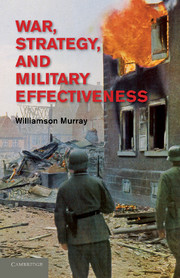Book contents
- Frontmatter
- Contents
- Introduction
- 1 History and the Future
- 2 Thucydides and Clausewitz
- 3 Clausewitz out, Computers in: Military Culture and Technological Hubris
- 4 Changing the Principles of War?
- 5 Military Culture Does Matter
- 6 History and Strategic Planning
- 7 Thoughts on Red Teaming
- 8 The Distant Framework of War
- 9 The Problem of German Military Effectiveness, 1900–1945
- 10 Reflections on the Combined Bomber Offensive
- 11 The Air War in the Gulf
- 12 Thoughts on British Intelligence in World War II and the Implications for Intelligence in the Twenty-First Century
- 13 The Meaning of World War II
- Index
- References
8 - The Distant Framework of War
Published online by Cambridge University Press: 07 October 2011
- Frontmatter
- Contents
- Introduction
- 1 History and the Future
- 2 Thucydides and Clausewitz
- 3 Clausewitz out, Computers in: Military Culture and Technological Hubris
- 4 Changing the Principles of War?
- 5 Military Culture Does Matter
- 6 History and Strategic Planning
- 7 Thoughts on Red Teaming
- 8 The Distant Framework of War
- 9 The Problem of German Military Effectiveness, 1900–1945
- 10 Reflections on the Combined Bomber Offensive
- 11 The Air War in the Gulf
- 12 Thoughts on British Intelligence in World War II and the Implications for Intelligence in the Twenty-First Century
- 13 The Meaning of World War II
- Index
- References
Summary
In August 1914, a catastrophic war exploded on a European Continent, a continent that at the time seemed far removed from the travails of war, slaughter, and rapine that had marked earlier centuries. The ensuing conflict represented a watershed in European history, largely determining the erratic and murderous course of the twentieth century. While there had been a number of conflicts on the Continent in the 99 years between 1815 and 1914, none had come close to the violence, length, and destruction that the Revolutionary and Napoleonic Wars had caused. Nor had any of those wars approached the violence and ferocity of what was to come in the Great War.
Yet, the First World War did not represent a new phenomena in European history. In his classic On War, Carl von Clausewitz had accurately described the French Revolution's impact on Europe in the following terms:
[B]ut in 1793 a force appeared and beggared all imagination. Suddenly war again became the business of the people – a people of thirty millions, all of whom considered themselves to be citizens.…The people became a participant in war; instead of governments and armies as heretofore, the full weight of the nation was thrown into the balance. The resources and efforts now available for use surpassed all conventional limits; nothing now impeded the vigor with which war could be waged, and consequently the opponents of France faced the utmost peril.
War, untrammeled by any conventional restraints, had broken loose in all its elemental fury. This was due to the peoples’ new share in the great affairs of state; and their participation in turn, resulted partly from the impact that the revolution had on the internal conditions of every state and partly from the danger that France posed to everyone.
- Type
- Chapter
- Information
- War, Strategy, and Military Effectiveness , pp. 168 - 194Publisher: Cambridge University PressPrint publication year: 2011



